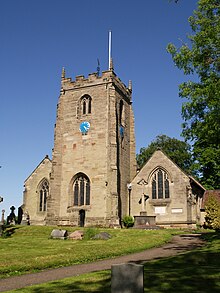St Mary Magdalene's Church, Lillington
| St Mary Magdalene's Church, Lillington | |
|---|---|
| Lillington Parish Church | |
 The church from the west | |
 | |
| Location | Vicarage Road, Lillington, Warwickshire, CV32 7RH |
| Country | England |
| Denomination | Church of England |
| Churchmanship | Central |
| History | |
| Status | Active |
| Dedication | St Mary Magdalene |
| Architecture | |
| Functional status | Parish church |
| Heritage designation | Grade II listed |
| Designated | 1 March 1949 |
| Administration | |
| Diocese | Diocese of Coventry |
| Archdeaconry | Archdeaconry of Warwick |
| Deanery | Warwick and Leamington |
| Parish | Lillington |
| Clergy | |
| Vicar(s) | The Revd William Smith |
| Asst Curate(s) | The Revd Sue Fairhurst |
| NSM(s) | The Revd Rosemary Pantling |
| Laity | |
| Reader(s) | Roderick Clark |
St Mary Magdalene's Church, Lillington is the Church of England parish church of Lillington, Warwickshire, a part of Royal Leamington Spa with a population of about 11,000. The church is at the junction of Vicarage Road and Church Lane. It has been a Grade II listed building since 1949.[1]
History
The earliest surviving parts of the present building are the possibly pre-Conquest doorway now located between the Lady Chapel and Sacristy, and the south wall of the chancel.[2][3] The Perpendicular Gothic west tower is 15th century, built in about 1480.[4]
The remainder of the church is Victorian, built or rebuilt between 1847 and 1884.[3]

The old south aisle was extended and the north aisle added in 1847. The south aisle was then demolished and a wider aisle built in 1868.[2] Dormer windows were inserted in the roof in 1875.[2] In 1884 the chancel, apart from the south wall, was rebuilt and the Lady chapel and Sacristy on the north side of the chancel were added, the Romanesque doorway being relocated for the second time since 1847.[2] Three of the stained glass windows are by C.E. Kempe and Company: the east window of the south aisle (1895) and two windows in the north aisle (1908 and 1920).[3] A choir vestry was added in 1914.[2] The pulpit is 20th century, designed by T. Lawrence Dale.[2] A detached octagonal meeting room in the churchyard was built in 1987.[4]
Benjamin Satchwell, co-founder, promoter and poet of the spa at nearby Leamington, married Mary Whitmore in this church on 23 April 1764.[5]
In the churchyard, opposite the vestry door, is the famous 'Miser's Grave'. The headstone of William Treen, who died aged 77 on 3 February 1810, carries this inscription, quoted in many nineteenth-century guides to Leamington,[6] and most famously by Nathaniel Hawthorne in Our Old Home[7] in 1863:
"I Poorly Liv'd and Poorly Dy'd,
Poorly Bury'd and no one Cry'd."
Bells
The church has a ring of eight bells.[8] The sixth bell is attributed to Thomas Harrys[9] of London,[10] cast about 1480,[9] which makes it contemporary with the tower. The seventh bell was cast in 1625 by Watts[9] of Leicester,[10] and the tenor in 1675 by Henry Bagley[9] of Chacombe,[10] Northamptonshire. Mears and Stainbank of the Whitechapel Bell Foundry cast the remaining five bells in 1927.[9] The bells were re-hung by Nicholson Engineering of Bridport, Dorset in 2007.[8]
Clock
Lillington church clock was made by Potts of Leeds and installed in 1897. It seems that the tower had no clock before then.[11] The clock was renovated, the four dials repainted and gilded, and the mechanism repositioned within the ringing chamber, by the Cumbria Clock Company of Penrith in 2007.[12]
See also
References
- ^ Historic England. "Church of St Mary Magdalene (1381217)". National Heritage List for England. Retrieved 5 June 2013.
- ^ a b c d e f Salzman, LF, ed. (1951). A History of the County of Warwick, Volume 6: Knightlow hundred. Victoria County History. London. pp. 161–164.
{{cite book}}: CS1 maint: location missing publisher (link) - ^ a b c Pevsner, Nikolaus; Wedgwood, Alexandra (1966). Warwickshire. The Buildings of England. Harmondsworth: Penguin Books. p. 340.
- ^ a b Brown, The Revd. Dennis (1999). The Story of Lillington Church.
- ^ Lillington Parish Registers, Warwickshire County Record Office DR426/5
- ^ James Bissett’s Descriptive Guide of Leamington Priors, 1814, et al.
- ^ Nathaniel Hawthorne, Our Old Home, 1863, http://www.eldritchpress.org/nh/ooh.html
- ^ a b Chester, Mike. "Lillington". Church Bells of Warwickshire. Archived from the original on 19 July 2011.
- ^ a b c d e Chester, Mike; Walters, T; Taulbut, R (25 July 2009). "Lillington S Mary Magd". Dove's Guide for Church Bell Ringers. Central Council of Church Bell Ringers. Retrieved 5 June 2013.
- ^ a b c Dovemaster (31 October 2012). "Bell Founders". Dove's Guide for Church Bell Ringers. Central Council of Church Bell Ringers. Retrieved 5 June 2013.
- ^ "Lillington Church". Windows on Warwickshire. Retrieved 7 January 2017.
- ^ Rededication of the Ring of Eight Bells. Lillington PCC. 2007.
